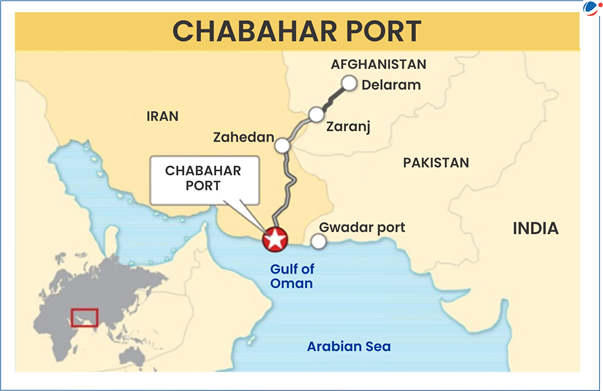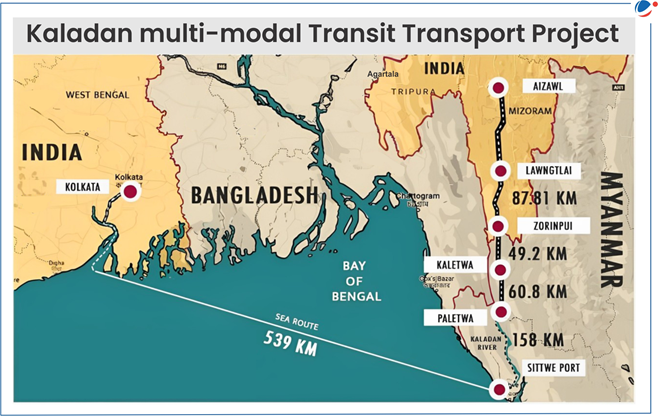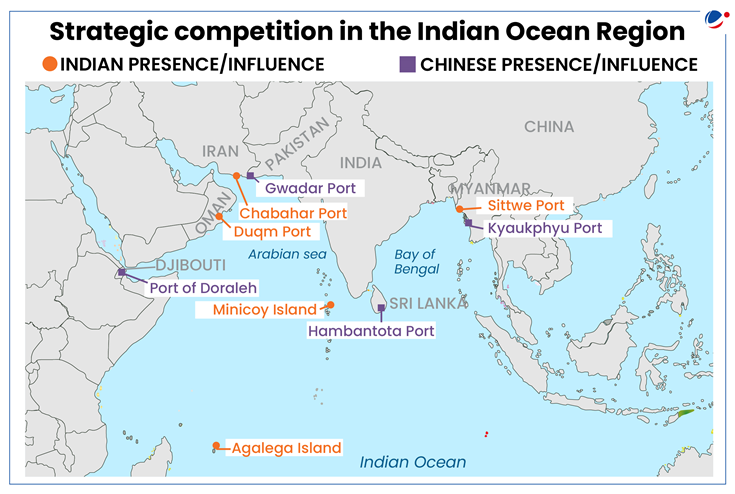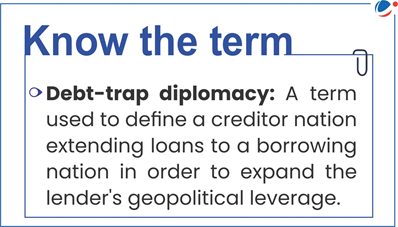Why in the news?
Recently, India signed a 10-year agreement with Iran for the development of the Shahid Beheshti Port Terminal at Chabahar Port.

More on the News
- The contract was signed between India Ports Global Limited (IPGL) and Ports and Maritime Organization (PMO) of Iran.
- IPGL is a company which is 100% owned by Sagarmala Development Company Limited, a company under administrative control of Ministry of Ports, Shipping and Waterways.
- India, Iran, and Afghanistan signed a trilateral agreement in 2016 for the development of the Chabhar port.
- The port will minimize the distance from India's west coast to landlocked Afghanistan, Central Asia and European nations bypassing Pakistan.
- In a related development, Ministry of External Affairs (MEA) has also approved the proposal for IPGL to take over the operations of the entire Sittwe port in Myanmar.
- The port is located on the Kaladan River and is a component of Kaladan Multimodal Transit Transport Project.
- These developments showcase the rising importance of ports not only as an economic aspect but also as a strategic tool of geopolitics.
 Kaladan Multimodal Transit Transport Project
|
Strategic Significance of Ports
- Act as geopolitical assets: Ports enhance the projection of strategic reach, which helps strengthen the country's control over important sea and energy supply routes.
- E.g. Indian Navy's staging base at Agalega Islands will enable marine patrols over the Mozambique Channel and allow to keep an eye on commercial corridors throughout southern Africa.
- Strengthens Maritime Security: E.g. Access to Sittwe port by Myanmar will improve India's capabilities for maritime domain awareness through presence in the Indian Ocean Region.
- Strengthening Bilateral and multilateral relationship: E.g. Allowing access to Duqm Port by Oman has made India's engagement with Gulf countries easier.
- Port Diplomacy: Ports have become important nodes in network of trade and projection of sea power.
- E.g. Access to Chabahar port by Iran gives India its opportunity to enter major trade partnerships with Central Asia and also counter China's economic influence in the region.
- Economic significance of ports:
- Enhance connectivity, facilitate trade and enable country's participation in the global value chain through integration of procurement, production and distribution systems.
- Opens avenues for transactions in Iocal currency (e.g. rupee) leading to its internationalisation.
- Port cities as global cities position a country at the centre of global trade and financial networks.
- Alternative route to safeguard economic and energy security:
- E.g. Investment in Gwadar port (Pakistan) will help China in surpassing Strait of Malacca and give it a shorter route for Middle East, Africa and Europe.

Challenges in Strategic use of Ports
- Rivalry among Nations: E.g., Ports have become highly significant in the rivalry between China and India to expand their influence, leading to creation of string of pearls (China) and necklace of diamonds (India) strategies.
- String of pearls is a theory according to which China wants to encircle India with a chain of Chinese-influenced ports throughout the Indian Ocean
- Loss of Sovereignty: Hold of rival nations on strategic port facilities may undermine long-term national interests.
- E.g. China's debt trap diplomacy (with respect to Hambantota) was considered an important contributor to Srilanka's economic crisis.
- Security and Safety concerns: Such concerns may also arise due to piracy as well as foreign or rival ownership of seaports.
- Heightened vulnerability: Channels of transportation, especially chokepoints may be manipulated or disrupted during periods of heightened geopolitical tension.
- Challenges related to India:
- Smaller neighbourhood nations (such as Srilanka, Bangladesh, Maldives etc.) consider themselves to be caught in geopolitical rivalry of China and India.
- Limited financial resources to further expand it geopolitical influence through development of overseas ports.
Way Forward

At global level
- Monitoring of risks which include irresponsible lending and misuse of commercial arrangements at host country ports to support military functions.
- Building security partnerships at the global level to safeguard seaports from opaque economic activity, which threatens host country sovereignty and global interests.
India Specific measures
- Explore multilateral partnerships with like-minded countries (e.g. QUAD countries) to protect India's maritime security interests while restricting China's larger footprint in the region.
- Establish a stronger presence in the Western Indian Ocean Region, where China is at a geographical disadvantage due to its more distant location.
Conclusion
As ports not only connect the two geographical realms of land and sea but also play the dual roles of economic gateways and nodes of geostrategic projection, their management becomes important in the current geopolitical transition.






